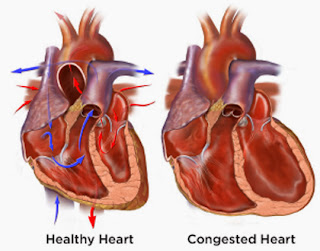CHF occurs due to number of reasons. Family history of coronary disease, congenital heart defects, damaged heart valves, prior cardiac arrests and chronic high blood pressure are some of the reasons which can cause CHF.
Causes of heart failure can be classified according to the following changes:
- Increased afterload, primarily resulting from obstructive lesions, such as valvular stenosis or coarctation of the aorta.
- Increased volume, especially in case of left-to-right shunts that cause the right ventricle to hypertrophy in order to compensate for the additional blood volume.
- High cardiac output demands, in which the body's need for oxygenated blood exceeds the cardiac output (even though the volume may be normal), such as in obstructive lung disease, hyperthyroidism and severe anemia.
- Myocardial factors that affect the contractility of the muscle fibers, such as myocardial ischemia from severe anemia or asphyxia, heart block, academia and low levels of potassium, glucose, calcium or magnesium.
- Heart palpitations (feeling the heart beat)
- Shortness of breath with exertion or when lying down
- Swelling in legs, feet and ankles (pooling of blood)
- Cough
- Weight gain
- Swelling of the abdomen
- Low blood pressure
- Loss of appetite, indigestion
- Irregular or rapid pulse
- Difficulty sleeping
- Weakness and fatigue
- Decreased urine production
- Nausea and vomiting
- Decreased in alertness or ability to concentrate
- Nighttime urination (the need to get out of bed to go to the bathroom)
Emergency Care Plan for Congestive Heart Failure
An emergency care plan with a buddy system is among the top list of priorities for primary caregivers. Every caregiver should have at least one other person [buddy], that is well trained to take over in their absence. Whether they are trained professionally or not, they must also be trained by the primary caregiver to the particular needs of the patient. The designated 'buddy' should be familiar with the routine of the patient, the medicine schedule and dosing, emergency medical contacts [doctors, hospitals, transport services, next of kin] and emergency procedures in addition to the care required.
The emergency care kit is a blessing to alternate caregivers as well as emergency medical professionals. It saves valuable time in emergency situations and provides accurate instructions, vital information, and can potentially save the patients life.





